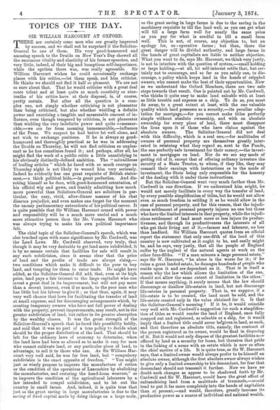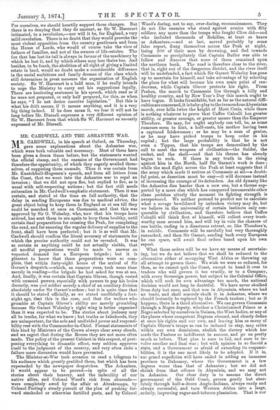TOPICS OF THE DAY.
SIR WILLIAM HARCOURT AT OXFORD.
THERE are certainly some men who are greatly improved by success, and we shall not be surprised if the Solicitor- General be one of them. His very good-humoured and
amusing speech to the Druids on New Year's Day showed all the enormous vitality and elasticity of his former speeches, and very little, indeed, of their big and bumptious self-importance, while the egotism there was, was really agreeable. Sir William Harcourt wishes he could occasionally exchange places with his critics,—let them speak, and him criticise. William Harcourt wishes he could occasionally exchange places with his critics,—let them speak, and him criticise.
He thinks we should not find it half so pleasant. We are not so sure about that. That he would criticise with a great deal more talent and at least quite as much causticity as nine- tenths of his critics have at their disposal, is, of course,
pretty certain. But after all the question is a com- plex one, not simply whether criticising is not pleasanter than being criticised, but also whether wielding a definite power and exercising a tangible and measurable amount of in- fluence, even though tempered by criticism, is not pleasanter than wielding the very indefinite power and quite unmeasur- able,—we are far from meaning immeasurable,—influence
of the Press. We suspect he had better let well alone, and not wish to exchange positions. If he is always as good- humoured and thoroughly practical as he was in addressing the Druids on Thursday, he will not find criticism so unplea- sant as he has sometimes found it ; and perhaps, after all, he might find the work of a public critic a little unsatisfying to his obviously distinctly-defined ambition. The " mitrailleuse of leading articles" which he faced with so much courage on Thursday night is not likely to wound him very seriously.
Indeed he evidently has one great requisite of British states- men,—a thick political hide,—in great perfection. And dis- robing himself as he does, with good-humoured ostentation, of his official wig and gown, and frankly admitting how much more powerful than Solicitors-General are solicitors in par- ticular, the easy, vivid, after-dinner manner of his chat disarms prejudice, and even makes one forget for the moment the uneasy parliamentary antecedents of his political career. It is quite possible that Sir William Harcourt armed with power and responsiblity will be a much more useful and a much more attractive person than the Mr. Vernon Harcourt who was always trying to make his own political importance felt.
The chief topic of the Solicitor-General's speech, which was also touched upon with some significance by Mr. Cardwell, was the Land Laws. Mr. Cardwell observed, very truly, that though it may be very desirable to get land more subdivided, it is by no means certain that facilities for sale will result in any such subdivision, since it seems clear that the price of land and the profits of trade are always rising,— two conditions which make it difficult to the poor to buy land, and tempting for them to enter trade. He might have added, as the Solicitor-General did add, that, even at its high price, land pays a fair interest to the large capitalist who can invest a great deal in its improvement, but will not pay more than a decent interest, even if so much, to the poor man who has little but his labour to give it ; so that thus, again, it may very well chance that laws for facilitating the transfer of land at small expense, and for discouraging arrangements which, by creating temporary owners who have not full power of dealing with the property, prevent improvements, may result, not in the greater subdivision of land, but rather in its greater absorption by the wealthy classes. It was the great strength of the Solicitor-General's speech that he faced this possibility boldly, and said that it was no part of a title policy to decide what should be the proper distribution of the land. That should be left for the ordinary laws of economy to determine, when the land laws had been so altered as to make it easy for men who cannot cultivate land, or any particular piece of land, to advantage, to sell it to those who can. As Sir William Har- court very well said, he was for free land, but "compulsory subdivision is the exact opposite of freedom." "You might just as wisely propose to improve the manufacture of cotton or the condition of the operatives of Lancashire by abolishing the manufactories, and restoring the hand-loom weavers," as to improve the condition of the agricultural labourers by a law intended to compel subdivision, and to let out the country in small farms. And, indeed, it is quite true that just as the great saving in large manufactories is due to the saving of fixed capital made by doing things on a large scale,
so the great saving in large farms is due to the saving in the machinery requisite to till the land well, as you can get what will till a large farm well for nearly the same price as you pay for what -is needful to till a small farm
well. This is not, of course, any objection to, but an apology for, co - operative farms ; but then, there the- great danger will be divided authority, and large farms in the hands of great capitalists are liable to neither objection. What you want to do, says Mr. Harcourt, we think very justly, is not to interfere with the question of system,—small holding or large holding,—at all, let self-interest settle that, but cer- tainly not to encourage, and so far as you safely can, to dis- courage, a policy which keeps land in the hands of crippled owners, who cannot make the best of their opportunities. Now as we understand the Oxford Members, there are two safe steps towards that result. One is pointed out by Mr. Cardwell, who thinks it quite easy to make land saleable with at least as little trouble and expense as a ship. To do so, you must do away, to a great extent at least, with the one valuable quality which land possesses as a security,—its peculiar adap- tation for mortgage,—for you cannot make titles perfectly simple without absolute ownership, and with an absolute ownership for every piece of land, there must disappear the liens upon it of those who have claims against the
absolute owners. The Solicitor-General did not deal with this difficulty, which is a real one,—for multitudes of owners of personal property are themselves greatly inter- ested in retaining what they regard as, next to the Funds, the one perfectly safe investment for their money,—the invest- ment in mortgages on land. Nor do we see any mode of getting rid of it, except that of offering ordinary investors the
of a State Trustee, to whom, if they like, they may commit their earnings with instructions as to the mode of investment, the State being only responsible for the honesty of the dealing with it under those instructions.
But the Solicitor-General went very much farther than Mr. Cardwell in one direction. If we understand him aright, he would not merely facilitate in every way the transfer of land, by every possible simplification of titles, but he would not allow even as much freedom in settling it as he would allow in the case of personal property, and for this reason, that the injudi- cious settlement of personal property injures no one but those who have the limited interests in that property, while the injudi- cious settlement of land must more or less injure its produc- tiveness, and through its productiveness the interests of all who get their living out of it,—farmer and labourer, no less than landlord. Sir William Harcourt quotes from an official report the statement that only one-fifth of the land of this country is now cultivated as it ought to be, and easily might be, and he says, very justly, that all the people of England suffer by the neglect of the natural agents at work on the other four-fifths. "If a man misuses a large personal estate," says Sir Vkr. Harcourt, "he alone is the worse for it : if he ruins a great landed estate, he damages hundreds of people who reside upon it and are dependent on it. That is in itself a reason why the law which allows the limitation of the one, should not allow the same extent of limitation in the other." If that means anything, it surely means that the law should discourage or disallow life-estates in land, but not discourage life-estates in personal property. That is, we suppo3e, if a life-estate is to be created, the land must be sold, and the life-estate created only in the value obtained for it. Is that the Solicitor-General's meaning ? If it be, it would coincide very well with Mr. Cardwell's suggestion for such a simplifica- tion of titles as would render the land of England, once fully mapped out and registered, as saleable as a ship, for it would imply that a limited title could never be!given in land, as such, and that therefore an absolute title, namely, the contract of the person registered as its owner, would be final in disposing of it. But it would not only dispose of the greatest facilities new offered by land as a security for loans, but threaten that pride in the linking of a name with an estate which is now so often the chief motive of a life. It is quite true, as Sir W. Harcourt says, that a limited owner would always prefer to be himself an absolute owner, although the first absolute owner always wishes to give only a limited ownership to his descendant, for fear that descendant should not transmit it further. Now we have no doubt such changes as appear to be shadowed forth by Mr. Cardwell and Sir W. Harcourt, would have tho great effect of enfranchising land from a multitude of trammels,—would tend to put it far more completely into the hands of capitalists than at present,—and would, therefore, greatly increase its productive power as a source of individual and national wealth. For ourselves, we should heartily support these changes. But there is no denying that they do amount, as Sir W. Harcourt intimated, to a revolution,—nor will it be, for England, a very mild revolution. There is no doubt that they would provoke the most violent opposition from the country gentlemen and from the House of Lords, who would of course take the view of fathers of families, and not of the owners of life-estates. The fox that has lost its tail is always in favour of the machinery by which he lost it, and by which others may lose theirs too. And besides, to be frank, the abolition of all right of giving a limited estate in land, would no doubt make a considerable difference in the social ambitions and family dreams of the class which still determines in great measure the organisation of English society. Sir W. Harcourt is a bold man, if he really intends to urge the Ministry to carry out his suggestions legally. There are hesitating sentences in his speech, which read as if he were not prepared, or only half prepared, for this, as when he says, "I do not desire coercive legislation." But this is what his drift means, if it means anything, and it is a very big thing indeed. If he does mean it, we fear it will not be long before Mr. Disraeli expresses a very different opinion of Sir W. Harcourt from that which Sir W. Harcourt so recently expressed of Mr. Disraeli.











































 Previous page
Previous page